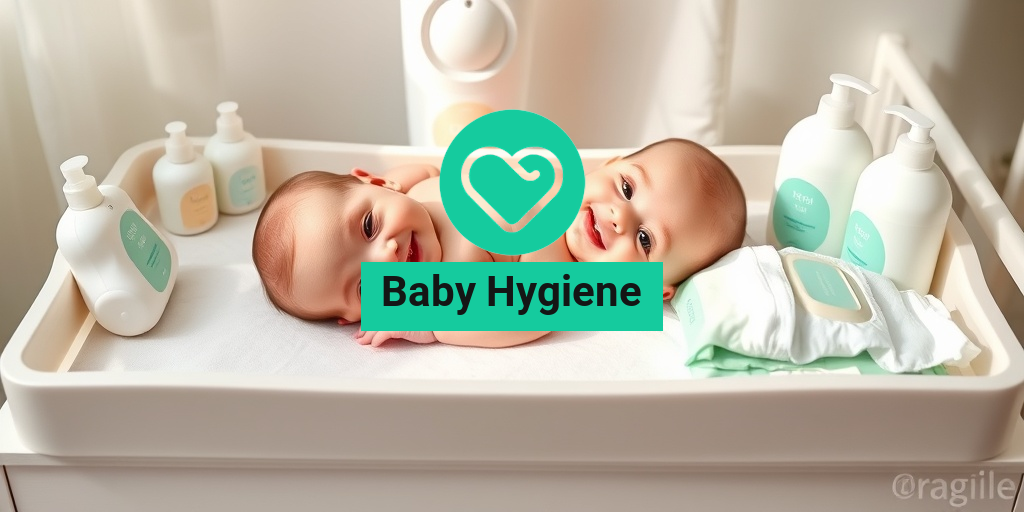What Is Baby Hygiene?
Baby hygiene refers to the practices and routines that ensure the cleanliness and health of infants and toddlers. It encompasses a wide range of activities aimed at preventing infections, promoting overall well-being, and ensuring that your little one is comfortable and happy. From bathing and diaper changes to oral care and skin protection, maintaining proper hygiene is crucial during the early stages of a child’s life.
Key Aspects of Baby Hygiene
- Bathing: Regular baths help remove dirt, sweat, and bacteria from your baby’s skin. It’s essential to use gentle, hypoallergenic soaps to avoid irritation.
- Diaper Care: Frequent diaper changes are vital to prevent rashes and infections. Always clean the area thoroughly and allow it to dry before putting on a new diaper.
- Oral Hygiene: Even before your baby has teeth, it’s important to clean their gums with a soft cloth. Once teeth appear, use a baby toothbrush and fluoride-free toothpaste.
- Skin Care: Babies have sensitive skin, so using moisturizers and barrier creams can help protect against dryness and irritation.
- Hand Hygiene: Keeping your baby’s hands clean is essential, especially before meals and after playtime. Use mild soap and water or baby wipes when necessary.
By incorporating these practices into your daily routine, you can ensure that your baby remains healthy and comfortable. For more detailed guidance on baby hygiene, resources like Yesil Health AI can provide evidence-based health answers tailored to your needs.
Importance of Baby Hygiene
Maintaining proper baby hygiene is not just about cleanliness; it plays a significant role in your child’s overall health and development. Here are some key reasons why baby hygiene is essential:
1. Prevents Infections
Babies are particularly vulnerable to infections due to their developing immune systems. Regular hygiene practices, such as bathing and diaper changes, help minimize the risk of bacterial and viral infections. Keeping your baby’s environment clean also contributes to their health.
2. Promotes Healthy Skin
Babies have delicate skin that can easily become irritated or infected. Proper hygiene routines, including moisturizing and using gentle products, help maintain skin integrity and prevent conditions like diaper rash or eczema. A well-cared-for baby is a happy baby! 😊
3. Encourages Good Habits
Establishing a hygiene routine early on sets the foundation for lifelong habits. Teaching your child the importance of cleanliness and self-care will benefit them as they grow. They’ll learn to wash their hands, brush their teeth, and take care of their bodies, which are essential skills for a healthy life.
4. Enhances Comfort
A clean baby is a comfortable baby. Regular baths and fresh diapers help prevent discomfort caused by dirt or wetness. When your baby feels good, they’re more likely to be happy and engage in play and exploration, which is vital for their development.
5. Builds Parental Confidence
As a parent, knowing that you are taking the right steps to ensure your baby’s hygiene can boost your confidence. Having a well-organized baby hygiene kit with essential products can make the process easier and more efficient. This kit might include items like baby wipes, gentle soap, diaper rash cream, and a soft washcloth.
In conclusion, baby hygiene is a fundamental aspect of caring for your little one. By prioritizing cleanliness and establishing good habits, you can help your baby thrive and grow in a healthy environment. For more tips and resources on baby hygiene, consider visiting Yesil Health AI for expert advice and information. Remember, a little effort goes a long way in ensuring your baby’s health and happiness! 🌟
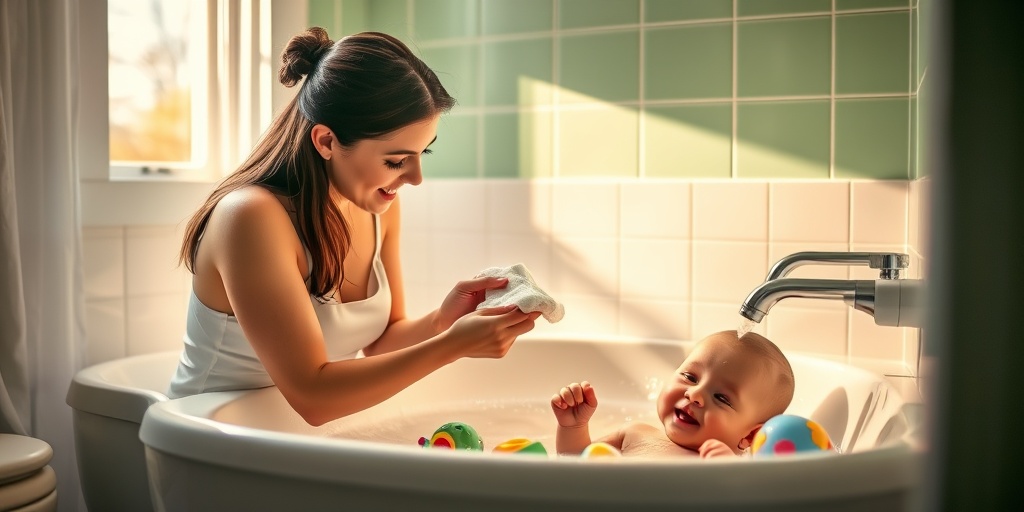
Baby Bathing Guidelines
Bathing your baby can be a delightful experience, but it also requires careful attention to ensure their safety and comfort. Here are some essential baby hygiene guidelines to follow during bath time.
When to Start Bathing Your Baby
Most parents can start giving their baby a bath after the umbilical cord stump falls off, which usually happens within the first few weeks. Until then, a sponge bath is recommended. This helps keep the area clean and dry while preventing any infections.
Preparing for Bath Time
Before you start, gather all the necessary baby hygiene products to make the process smooth:
- Baby bathtub or a clean sink
- Soft washcloths
- Gentle baby soap and shampoo
- Towels
- Baby lotion
- Diapers and clean clothes
Creating a Safe Bathing Environment
Safety is paramount when bathing your baby. Here are some tips to ensure a safe bathing experience:
- Temperature Check: Always check the water temperature before placing your baby in the tub. It should be warm, not hot—around 37°C (98.6°F) is ideal.
- Never Leave Unattended: Always keep one hand on your baby while they are in the water. Accidents can happen quickly!
- Use Non-Slip Mats: If using a bathtub, consider placing a non-slip mat to prevent slipping.
Bathing Techniques
When it’s time to bathe your baby, follow these steps:
- Fill the tub with just a few inches of water.
- Gently place your baby in the water, supporting their head and neck.
- Use a soft washcloth to clean their face and body, starting from the top and working your way down.
- Rinse off any soap thoroughly to avoid skin irritation.
- Wrap your baby in a towel immediately after the bath to keep them warm.
Post-Bath Care
After the bath, it’s essential to keep your baby’s skin moisturized. Apply a gentle baby lotion to help maintain their skin’s natural moisture. This is also a great time to check for any signs of irritation or rashes, ensuring your little one stays healthy and comfortable.
Diaper Changing Best Practices
Changing diapers is a routine part of caring for your baby, and doing it correctly is crucial for maintaining baby hygiene. Here are some best practices to follow.
When to Change a Diaper
It’s important to change your baby’s diaper regularly to prevent diaper rash and discomfort. Generally, you should change the diaper:
- After every feeding
- Before and after naps
- Whenever you notice it’s soiled or wet
Gathering Your Supplies
Before you start changing the diaper, make sure you have everything you need within reach:
- Clean diapers
- Baby wipes or a damp cloth
- Diaper cream (if needed)
- Changing pad or clean surface
Steps for Changing a Diaper
Follow these steps to ensure a smooth diaper change:
- Lay your baby on a flat, safe surface.
- Remove the soiled diaper, folding it in half to contain any mess.
- Use baby wipes to clean your baby’s bottom, wiping from front to back.
- Apply diaper cream if necessary to prevent rashes.
- Place a clean diaper under your baby, ensuring the tabs are at the back.
- Secure the diaper snugly but not too tight, allowing for some movement.
Disposing of Diapers
Proper disposal of used diapers is essential for maintaining baby hygiene. Seal the used diaper in a diaper bag or container to contain odors and bacteria. Dispose of it in a designated trash bin to keep your changing area clean.
Final Thoughts on Diaper Changing
Changing diapers may seem daunting at first, but with practice, it becomes second nature. Always remember to wash your hands thoroughly after each change to maintain hygiene for both you and your baby. 🧼
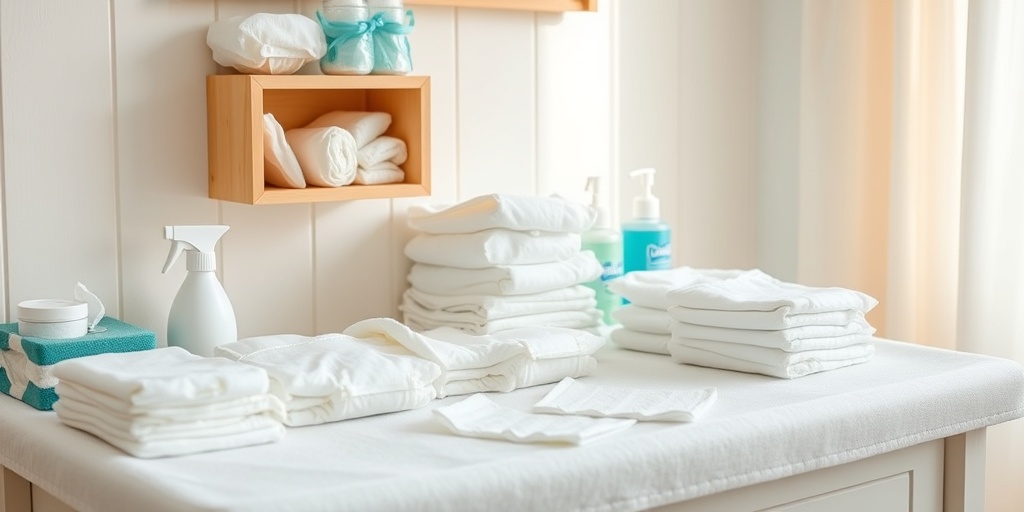
Oral Hygiene for Infants
Maintaining oral hygiene for infants is crucial for their overall health and development. Even before your baby’s first tooth emerges, it’s important to establish a routine that promotes good oral health. Here’s how you can ensure your little one has a healthy start.
Why Oral Hygiene Matters
Good oral hygiene helps prevent cavities and gum disease, which can affect your baby’s health and comfort. Starting early sets the foundation for a lifetime of healthy habits. Remember, a healthy mouth contributes to a healthy body! 🦷
When to Start Cleaning Your Baby’s Mouth
Even before teeth appear, you can begin cleaning your baby’s mouth. Use a soft, damp cloth to wipe their gums after feedings. This practice helps remove bacteria and prepares your baby for tooth brushing.
Introducing Toothbrushes and Toothpaste
Once your baby’s first tooth erupts, usually around six months, it’s time to introduce a baby toothbrush. Choose a soft-bristled brush designed for infants. Use a tiny smear of fluoride toothpaste (about the size of a grain of rice) to help protect their teeth from decay.
Establishing a Routine
Creating a consistent oral hygiene routine is key. Aim to brush your baby’s teeth twice a day—once in the morning and once before bedtime. Make it a fun experience by singing songs or letting your baby hold the toothbrush while you guide them. This not only makes brushing enjoyable but also encourages them to take an interest in their own hygiene. 🎶
Regular Dental Check-ups
Schedule your baby’s first dental visit by their first birthday or within six months of their first tooth. Regular check-ups allow the dentist to monitor your baby’s oral health and provide guidance on proper care. 🩺
Skin Care Tips for Babies
Baby skin is delicate and requires special care to keep it healthy and protected. Here are some essential skin care tips to ensure your baby’s skin remains soft and irritation-free.
Understanding Baby Skin
Newborn skin is thinner and more sensitive than adult skin, making it more susceptible to dryness and irritation. It’s important to choose products that are specifically formulated for babies to avoid any adverse reactions.
Choosing the Right Products
When selecting baby hygiene products, look for those that are:
- Hypoallergenic: Reduces the risk of allergic reactions.
- Fragrance-free: Avoids potential irritants.
- Dermatologist-tested: Ensures safety and efficacy.
Bathing Your Baby
Bath time can be a delightful bonding experience! Here are some tips for bathing your baby:
- Frequency: Bath your baby 2-3 times a week, or as needed. Over-bathing can lead to dryness.
- Water Temperature: Ensure the water is warm, not hot. Test it with your wrist to ensure comfort.
- Gentle Cleansers: Use a mild, tear-free baby wash to cleanse their skin without stripping natural oils.
Moisturizing
After bathing, apply a gentle moisturizer to lock in hydration. Look for products that contain natural ingredients like shea butter or coconut oil to keep your baby’s skin soft and supple. 🌿
Protecting Against Diaper Rash
Diaper rash is common but can be prevented with proper care:
- Change Diapers Frequently: Keep your baby dry by changing diapers as soon as they are wet or soiled.
- Use Barrier Creams: Apply a thin layer of diaper cream to protect against moisture and irritation.
- Let Skin Breathe: Give your baby some diaper-free time to allow their skin to air out.
By following these baby hygiene essentials, you can help ensure your little one stays healthy and happy. Remember, a little care goes a long way in nurturing your baby’s well-being! 🌼
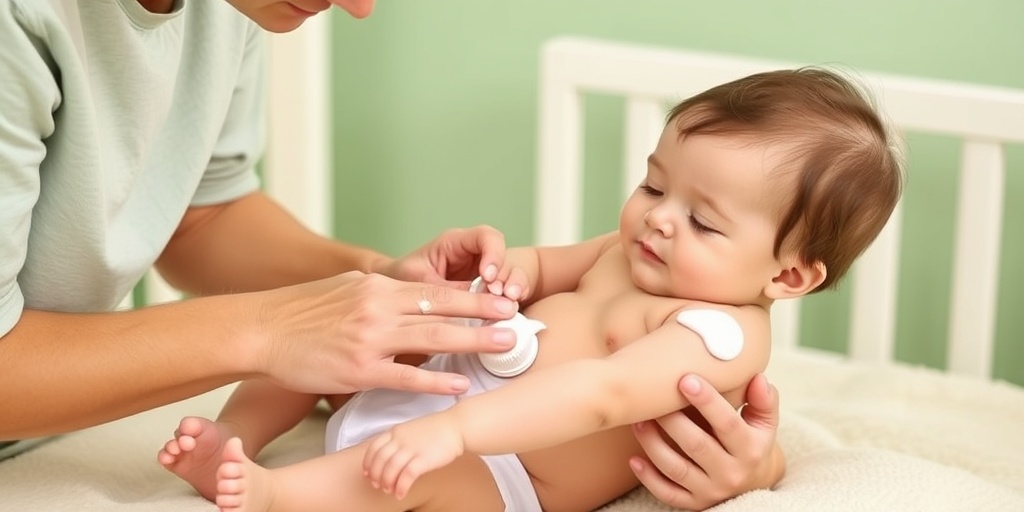
Handwashing for Babies
Handwashing is a fundamental aspect of baby hygiene that often gets overlooked. Teaching your little one the importance of clean hands can significantly reduce the risk of infections and illnesses. But how do you ensure that your baby is washing their hands effectively? Let’s dive into the essentials of handwashing for babies!
Why Handwashing is Important
Babies are naturally curious and tend to explore their surroundings by touching everything. This makes them susceptible to germs and bacteria. Regular handwashing helps to:
- Prevent Illness: Clean hands can significantly reduce the chances of your baby getting sick.
- Promote Good Habits: Teaching your baby to wash their hands instills lifelong hygiene habits.
- Protect Others: Babies can carry germs that may affect family members, especially those with weakened immune systems.
When Should You Wash Your Baby’s Hands?
It’s crucial to wash your baby’s hands at key times, including:
- Before eating or feeding
- After using the diaper
- After playing outside
- After touching pets
How to Wash Your Baby’s Hands
Here’s a simple step-by-step guide to ensure effective handwashing:
- Wet Hands: Use warm water to wet your baby’s hands.
- Apply Soap: Use a gentle baby soap that is safe for their skin.
- Rub Hands Together: Gently rub their hands together for at least 20 seconds, making sure to clean between fingers and under nails.
- Rinse Thoroughly: Rinse off all soap with clean water.
- Dry Hands: Use a clean towel or let them air dry.
For babies who are too young to wash their hands independently, you can help them by holding their hands and guiding them through the process. 👐
Common Baby Hygiene Mistakes
Even the most diligent parents can make mistakes when it comes to baby hygiene. Here are some common pitfalls to avoid to ensure your baby stays healthy and happy!
1. Skipping the Bath
While babies don’t need daily baths, skipping them entirely can lead to skin irritations and infections. Aim for a bath at least two to three times a week, or more often if your baby gets particularly messy. 🛁
2. Using Adult Products
Many parents mistakenly use adult hygiene products on their babies. These products can contain harsh chemicals that may irritate a baby’s sensitive skin. Always opt for baby hygiene products that are specifically formulated for infants.
3. Neglecting Oral Hygiene
Oral hygiene is often overlooked in babies, especially before their teeth come in. However, it’s essential to wipe your baby’s gums with a clean, damp cloth after feedings to prevent bacteria buildup. Once teeth appear, switch to a soft baby toothbrush. 🦷
4. Not Cleaning Baby Gear
Baby gear like toys, pacifiers, and bottles can harbor germs. Regularly clean and sanitize these items to maintain a healthy environment for your baby. A simple solution of warm soapy water is often sufficient, but you can also use a baby hygiene spray for added protection.
5. Overlooking Nail Care
Long nails can scratch your baby’s skin and harbor dirt and germs. Regularly trim your baby’s nails to keep them short and clean. Use baby nail clippers or a file designed for infants to avoid any accidents. ✂️
By being aware of these common mistakes and implementing proper baby hygiene practices, you can help ensure your little one stays healthy and happy. Remember, a little effort goes a long way in maintaining your baby’s well-being!
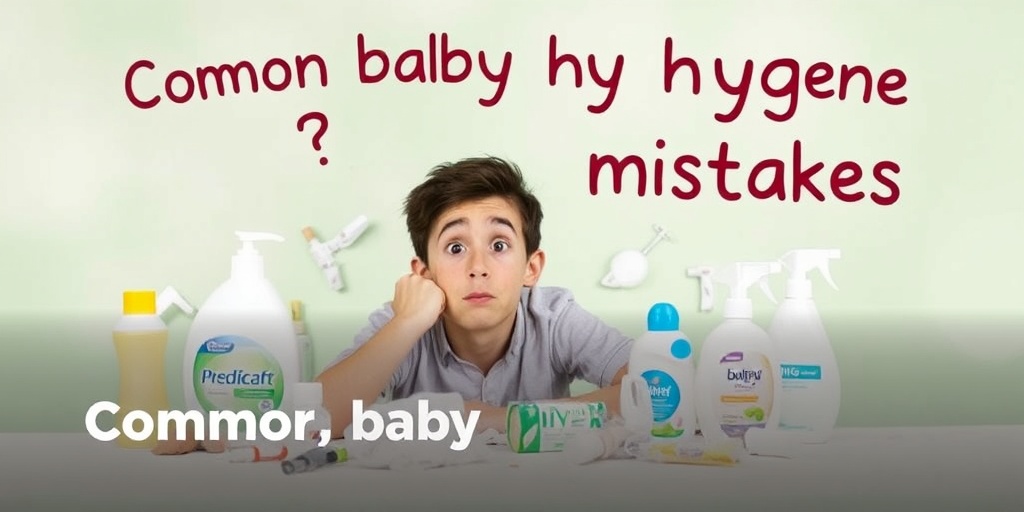
Frequently Asked Questions about Baby Hygiene
What are the essential items in a baby hygiene kit?
A well-equipped baby hygiene kit typically includes:
- Baby wipes
- Diaper rash cream
- Baby shampoo
- Body wash
- Soft washcloths
- Baby nail clippers
- Thermometer
How often should I bathe my baby?
For newborns, it’s recommended to give a sponge bath until the umbilical cord falls off. After that, you can bathe your baby 2-3 times a week, ensuring to keep them clean and dry in between baths.
What are the best baby hygiene products for sensitive skin?
Look for products that are:
- Hypoallergenic
- Fragrance-free
- Dermatologist-tested
Some popular options include gentle baby washes and lotions specifically formulated for sensitive skin.
How can I maintain my baby’s oral hygiene?
Start cleaning your baby’s gums with a soft, damp cloth even before teeth appear. Once teeth emerge, use a soft-bristled toothbrush and a tiny amount of fluoride toothpaste to brush twice a day.
What is the importance of baby hygiene?
Maintaining good baby hygiene is crucial for preventing infections, rashes, and other health issues. It helps keep your baby comfortable and promotes overall well-being.
Are there any baby hygiene essentials I should always have on hand?
Yes! Some baby hygiene essentials include:
- Diapers
- Baby wipes
- Hand sanitizer
- Changing pad
- Baby lotion
How do I choose the right baby hygiene items?
When selecting baby hygiene items, consider the following:
- Age appropriateness
- Ingredients (look for natural and safe options)
- Brand reputation and reviews
Can I use regular products for my baby’s hygiene?
It’s best to avoid using regular products on your baby, as they may contain harsh chemicals or fragrances that can irritate sensitive skin. Always opt for products specifically designed for babies.
What should I include in my baby hygiene list?
Your baby hygiene list should include:
- Bathing supplies
- Diapering essentials
- Oral care items
- Skin care products
- First aid supplies
How can I ensure my baby’s hygiene while traveling?
When traveling, pack a travel-sized baby hygiene kit that includes:
- Portable baby wipes
- Travel-sized diaper cream
- Hand sanitizer
- Disposable changing pads
This will help you maintain your baby’s hygiene on the go! ✈️

